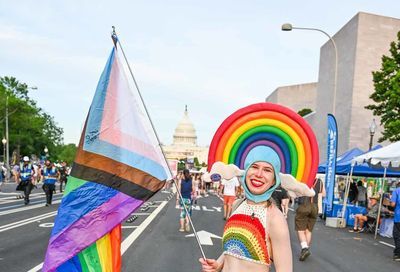Federal appeals court finds Wisconsin, Indiana same-sex marriage bans unconstitutional

A federal appeals court Thursday affirmed lower court rulings finding same-sex marriage bans in Indiana and Wisconsin unconstitutional, marking yet another victory for marriage equality at the appellate court level.
In a 3-0 decision, the 7th Circuit Court of Appeals found laws in Indiana and Wisconsin prohibiting same-sex couples from marrying and recognizing marriages entered into by same-sex couples in other states in violation of the U.S. Constitution.
According to the 40-page unanimous ruling authored by Judge Richard Posner, who was nominated to the federal bench by President Ronald Reagan, “discrimination against same-sex couples is irrational, and therefore unconstitutional even if the discrimination is not subjected to heightened scrutiny.”
“Our pair of cases is rich in detail but ultimately straight forward to decide,” Thursday’s ruling states. “The challenged laws discriminate against a minority defined by an immutable characteristic, and the only rationale that the states put forth with any conviction — that same-sex couples and their children don’t need marriage because same-sex couples can’t produce children, intended or unintended —is so full of holes that it cannot be taken seriously. To the extent that children are better off in families in which the parents are married, they are better off whether they are raised by their biological parents or by adoptive parents.”
Ruling in two cases, the court found the governments of Indiana and Wisconsin have given no reason to think they have a “reasonable basis” for forbidding same-sex marriage.
“Discrimination by a state or the federal government against a minority, when based on an immutable characteristic of the members of that minority (most familiarly skin color and gender), and occurring against an historical background of discrimination against the persons who have that characteristic, makes the discriminatory law or policy constitutionally suspect,” the ruling states.
Oral arguments were heard before the 7th Circuit Court of Appeals last week in Chicago.
The decision marks the fourth appellate court victory for marriage equality since the U.S. Supreme Court struck down Section 3 of the federal Defense of Marriage Act in June 2013. Since last year’s ruling in Windsor, federal courts have overturned same-sex marriage bans in Utah, Ohio, Oklahoma, Kentucky, Idaho, Illinois, Indiana, Michigan, Pennsylvania, Tennessee, Texas, Virginia, Oregon, Wisconsin, Indiana, Colorado and Florida. Federal appeals courts have ruled 2-1 to uphold such rulings in Utah, Oklahoma and Virginia. The Supreme Court has been asked to hear all three of those decisions and will likely be asked to consider the Indiana and Wisconsin cases as well. Yesterday, a federal judge broke the string of federal court victories for marriage equality when he found Louisiana’s same-sex marriage ban constitutional.
Much as was the case during oral arguments, Thursday’s ruling from the 7th Circuit dismisses and criticizes arguments made by the states that same-sex marriage bans are necessary to successfully raise children, particularly one made by Indiana’s lawyer that state law encourages opposite-sex couples who procreate to marry.
“In other words, Indiana’s government thinks that straight couples tend to be sexually irresponsible, producing unwanted children by the carload, and so must be pressured (in the form of governmental encouragement of marriage through a combination of sticks and carrots) to marry, but that gay couples, unable as they are to produce children wanted or unwanted, are model parents — model citizens really — so have no need for marriage,” the ruling states. “Heterosexuals get drunk and pregnant, producing unwanted children; their reward is to be allowed to marry. Homosexual couples do not produce unwanted children; their reward is to be denied the right to marry. Go figure.”
Wisconsin’s argument that the state’s definition of marriage as between one man and one woman is the outcome of the democratic process, having been defined by a popular vote, was also easily dismissed: “Minorities trampled on by the democratic process have recourse to the courts; the recourse is called constitutional law.”
Support Metro Weekly’s Journalism
These are challenging times for news organizations. And yet it’s crucial we stay active and provide vital resources and information to both our local readers and the world. So won’t you please take a moment and consider supporting Metro Weekly with a membership? For as little as $5 a month, you can help ensure Metro Weekly magazine and MetroWeekly.com remain free, viable resources as we provide the best, most diverse, culturally-resonant LGBTQ coverage in both the D.C. region and around the world. Memberships come with exclusive perks and discounts, your own personal digital delivery of each week’s magazine (and an archive), access to our Member's Lounge when it launches this fall, and exclusive members-only items like Metro Weekly Membership Mugs and Tote Bags! Check out all our membership levels here and please join us today!
























You must be logged in to post a comment.